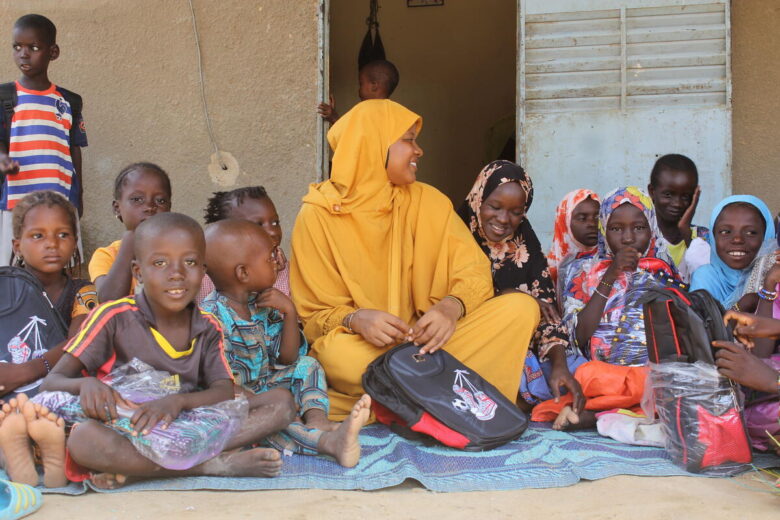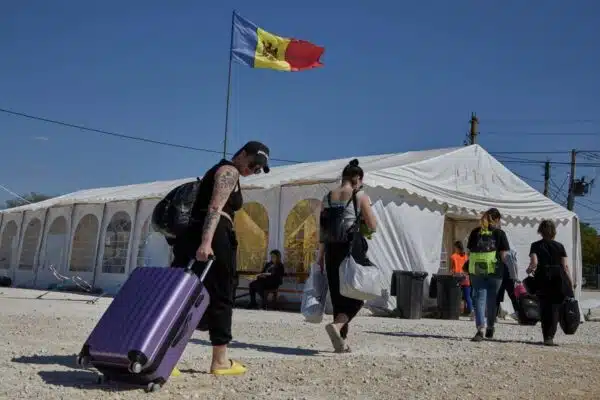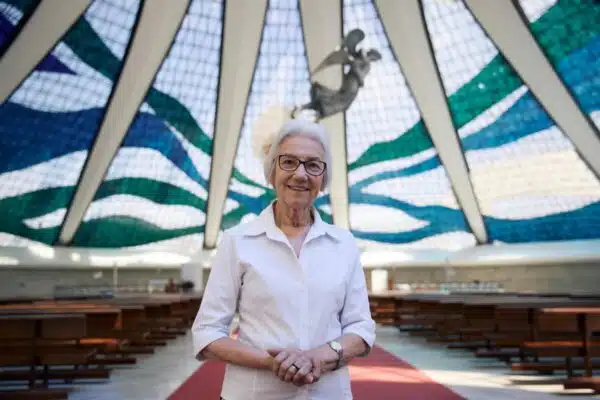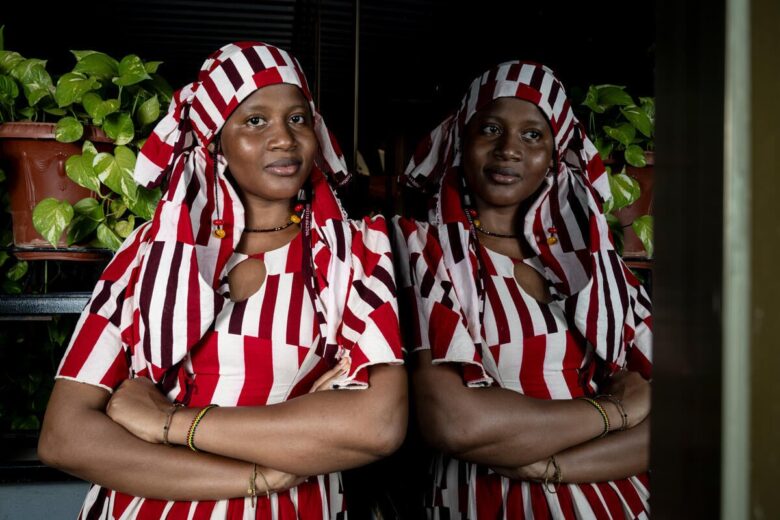
Maimouna Ba, 28, has transformed the lives of young people in Burkina Faso through education. © UNHCR/Etinosa Yvonne
As conflict forced thousands of children to flee to the safety of her hometown, Maimouna Ba rallied the community to provide support and education
By Cedric Kalonji Mfunyi
Born and raised in Dori, in the far northeast of Burkina Faso, Maimouna Ba was the youngest of 12 children living in the country’s vast, remote and arid Sahel region, a six-hour drive from the capital, Ouagadougou.
She and her sisters were the first girls in her family to go to school, and it was an opportunity they all seized. For Maimouna, it revealed the power of education. “I believe my life has changed because I am more educated, and I believe that because I am more educated, my family’s life has changed,” she said.
Maimouna went on to study marketing at university, but instead of pursuing a career in her field of study, she made it her mission to change the lives of others through education, bringing hope and maybe even peace to her conflict-wracked country. “I believe education is the most powerful weapon to change the world,” she said.
Conflict and displacement
Since 2016, Burkina Faso has been in the throes of political instability and violent conflict that has left over 2 million people internally displaced and forced more than 200,000 to become refugees in neighbouring countries. Despite facing its own challenges, the country has generously welcomed nearly 41,000 refugees and asylum-seekers, primarily from Mali, with almost 60 per cent of them settling in the Sahel region bordering Mali and Niger.
This region, which is the focus of Maimouna’s work, has been particularly affected by the displacement crisis, resulting in a large influx of internally displaced people towards Dori, the regional capital. Already home to Malian refugees, the city is now facing overpopulation.
When the first displaced people – the vast majority of whom are women and children – began arriving in Dori, Maimouna asked herself, “How can we give these children a glimmer of hope and give these women dignity?”
She founded her organization Femmes pour la Dignite du Sahel (Women for the Dignity of the Sahel), together with around a dozen other women, in 2020 to provide school fees for displaced children, and skills to displaced women.
She collected donations, rallied support and encouraged volunteers to join her. Since then, her Un Enfant, Un Parrain (One Child, One Sponsor) programme has matched vulnerable children with individual sponsors who contribute towards their school fees. This school year alone, more than 120 children have been enrolled in the programme.

Maimouna Ba (rear, in pink) organizes a tree planting activity with a group of internally displaced primary school children who received scholarships through her organization. © Courtesy of Maimouna Ba
But sponsors do more than just provide fees. Maimouna strives to forge a direct connection between the children and their sponsors, who are Burkinabe from all walks of life, ready to offer kindness and psychological support as well as cash. The benefits go both ways, she said.
“I don’t know if you know that feeling, when you sense that there is a person who was in total despair, in a situation that they thought was unchangeable, insoluble, who actually sees that there are possibilities for them?” Maimouna said, a bright smile spreading across her face. “I experience that everyday in the work that I do … And that makes me feel useful and makes me believe we are getting there, as long as we continue to persevere.”
“I don’t see myself as a hero,” she added. “I just see myself as a person who has convictions that she fights for. My belief is that we don’t need much to change the world. It all starts within us.”
Mother of the Sahel
Tall, with a penchant for colourful dresses and matching headscarves, Maimouna cuts a striking figure and, despite being just 28 years old, her work has earned her the nickname “Maman Sahélienne”, or “Mother of the Sahel”. Now, in recognition of her commitment to the education of displaced children in Burkina Faso, Maimouna has been named the 2024 regional winner for Africa of the UNHCR Nansen Refugee Award.
“We don’t need much to change the world. It all starts within us.”
Maimouna Ba
“Education is one of the best ways to combat violent extremism, the lack of social cohesion and the lack of peace, all of which stem from ignorance,” she said. “My hope is that the sons of the Sahel who have taken up arms, whatever their convictions, come to their senses and understand that our ancestors are right when they say that fire has never put out fire and that development, even if it has been slow, is always possible.”
In addition to her work with children, Maimouna’s organization teaches displaced women the skills to start small businesses that allow them to earn enough to send their children to school and cover their own needs.
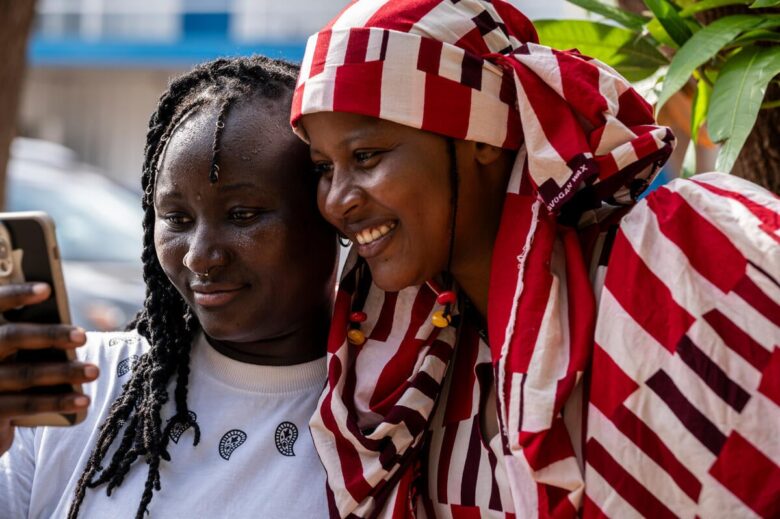
Maimouna takes a photo with a member of UNHCR staff outside the agency’s office in Ouagadougou, Burkina Faso. © UNHCR/Etinosa Yvonne
“I have always been a dreamer.”
Maimouna Ba
To some, Burkina Faso’s multifaceted crisis may seem insoluble, but not to Maimouna. “I have always been a dreamer,” she said. “I have always set myself very ambitious goals that I have never thought were unachievable.”
She cited a proverb to explain her conviction that the solutions to her country’s crisis must come from the people of Burkina Faso.
“When an egg breaks from the outside, life ends, but when it breaks from the inside life begins,” she said. “I believe if there is to be a change, an improvement in the situation in the Sahel, it must start within the Sahel, with the commitment of the daughters and the sons of the Sahel.”
Originally published by UNHCR on 9 October 2024.



